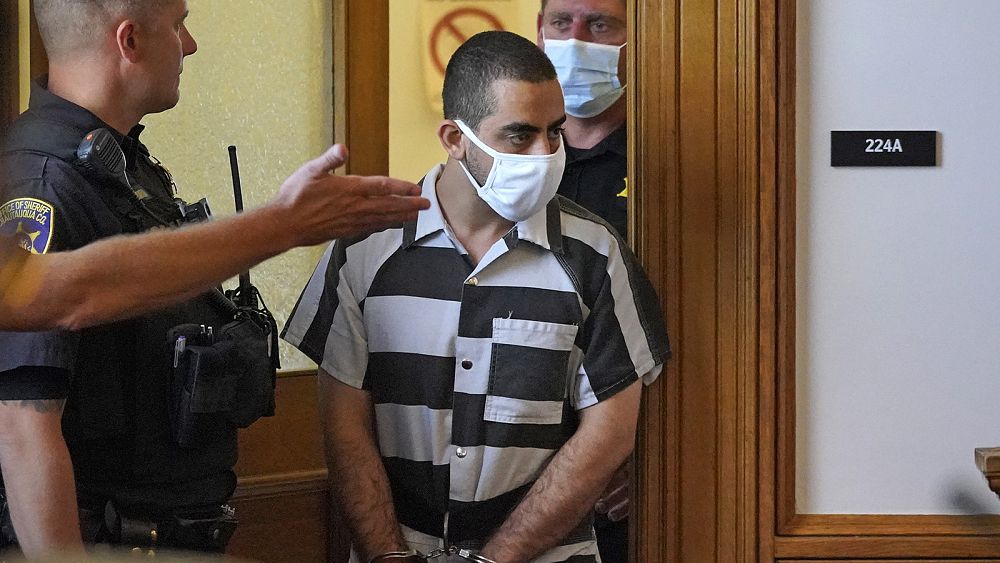The suspect in the attack on Salman Rushdie pleaded not guilty to attempted murder and assault in a New York courtroom on Thursday.
The 24-year-old Hadi Matar is accused of stabbing Rushdie, the famed author of Midnight’s Children, at a conference Friday in nearby Chautauqua.
Arrested immediately after the incident, the suspect had already pleaded not guilty at a procedural hearing on Saturday.
Masked, handcuffed and dressed in a black and white striped prison uniform, Matar spoke on Thursday through his lawyer.
He faces up to 25 years in prison for attempted murder and up to seven years for assault. The judge chose to keep him in custody without the possibility of bail. At the previous hearing, prosecutors had called the attack premeditated.
His attorney Nathaniel Barone stressed Thursday that his client was entitled to a “fair trial” and respect for the “presumption of innocence”.
Matar ‘surprised’ Rushdie survived
Interviewed Wednesday by the New York Post, which claims to have contacted him in prison, Hadi Matar said he was “surprised” that Salman Rushdie survived the attack.
The 75-year-old British author, who was stabbed about ten times in the neck and abdomen and evacuated by helicopter to a hospital, was briefly put on a respirator before his condition improved.
Matar did not say whether he was inspired by the fatwa issued by Ayatollah Khomeini in 1989 from Iran, calling for the death of the writer, his book The Satanic Verses having been deemed blasphemous by the Iranian Supreme Leader.
He just explained to the New York Post that he had “esteem for the ayatollah”, who is “a remarkable person”.
As for Rushdie, Matar said he was not “a good man”. “I don’t like this person,” he said.
“He is someone who has attacked Islam,” he added. Watching videos of the author on YouTube, he found him to be a “hypocrite” but admitted that he had only read two pages of the book that was claimed to have been the reason for the fatwa.
Hadi Matar had returned “changed” and more religious from a 2018 trip to Lebanon — his family’s home country — his mother told the Daily Mail website on Monday.
Police protection and attacks against translators
Rushdie, born in 1947 in India in a family of non-practising Muslim intellectuals, provoked the anger of a part of the Muslim world with the publication in 1988 of The Satanic Verses, a novel considered by the most rigorous as blasphemous towards the Koran and the Prophet Muhammad.
Khomeini, the founder of the Islamic Republic of Iran, issued a fatwa in 1989 calling for Rushdie’s murder, forcing him to live under police protection for years.
Fatwa is a religious ruling mostly reserved as a final say in interpretations of the holy scripture or Islamic laws stemming from it. However, in Iran, the ruling has sometimes been used to condemn individuals such as Rushdie.
Khomeini’s fatwa against the writer was never lifted, and many of Rushdie’s translators were attacked.
After three days of silence, Iran on Monday denied any involvement in the attack, placing the blame on Rushdie himself.
“In this attack, only Salman Rushdie and his supporters deserve to be blamed and even condemned,” said Nasser Kanani, spokesman for the Iranian Foreign Ministry.
Rushdie, who had settled in New York for twenty years, became an American citizen in 2016.
Despite the threat, he had appeared more and more frequently in public, often without visible escort, while continuing to champion satire and irreverence in his books.
In an interview with the German magazine Stern a few days before Friday’s attack, he said he was “optimistic” and confided: “Since I have been living in the United States, I have no more problems (…) My life is normal again.”
Matar is due to appear in court again on 7 September.
















.jpg?itok=F2C4uk0x)



Discussion about this post